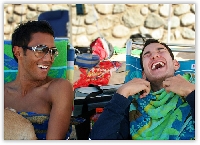Why people laugh
By Catalogs Editorial Staff

Why people laugh and what causes laughter
Laughter can be contagious. You are with a group of friends and something is said. Something is done. And you just lose it, bust up, in stitches, your friends joining. It’s a comedic night to remember.But why do people laugh? Some researchers believe that it comes from the incongruity of the joke, that we, as the listener, feel something isn’t quite right. When the punchline of the joke resolves it in such a way that we aren’t expecting it, it makes us chuckle and crack a smile. It’s about the sense of absurdity with many jokes told.
In a similar way, novelty items and prank props make people laugh. They are often unexpected, out-of-the-ordinary or bizarre twists on what is usual or everyday.
Before you continue reading about the Why people laugh there is a special announcement we would like to share with you. Catalogs.com has negotiated special medicare rates for our vibrant community of seniors. If you are over the age of 60, you can head over to our Seniors Health Section which is full of information about medicare. All you need is your zip code and a few minutes of your time to potentially save 100s of dollars on your medicare bills.
But, there is so much more at play as to why people laugh.
A History of Our Reactions to Humor
Chimpanzees and gorillas will sound off with a panting sound when tickled. Which, hard as it is to believe, could be the beginnings of human chuckling all those years ago. It seems our ancient primate ancestors panted when they thought something was humorous. This has steadily evolved into what we know today as our chuckling responses to humor.
~
As we know it today, it’s safe to say that our responses to humor mostly happen in relation to group settings and social gatherings. Laughter is a way to send a message to someone else, to interact with them. It happens in a completely unconscious manner and it’s about the moment between two people, or a group, that makes it truly special.
What Is It All About?
Robert Provine is a PhD holder who teaches psychology and neuroscience at the University of Maryland, Baltimore County. He says that the first laughter usually shows up at around 3.5 to 4 months in infants. So, it’s even before learned speech for babies. Smiling and giggling is really just a way for infants to try and interact with their mothers, according to Provine.
Human amusement comes from a playful intent, which acts as a group bonding function for us as people. For children, cracking up is truly exuberant. As a person ages, this sense of hilarity somewhat recedes. This can be because of the association of giggling with play for children. Having fun, enjoying one’s self as they run around with other kids, can be a catalyst for smiling and laughing. Tickling, chasing, play-fighting, and more, can invoke this spirit within children.
The Superiority Theory
Certain researchers state that the reason people chuckle is to help show they are on a level at — or above — those around them. This can be seen in work environments, the dating scene, and nights out with friends. In an article in The Economist, the writer makes a case for the superiority theory.
Bosses usually tell more jokes than do their subordinates in the office place. Women have been known to giggle more at humor when in the presence of men, while men will normally tell more jokes while in the company of women. It’s been shown in studies that men chortle more loudly when amidst their male friends and tend to tone it down a few notches when with those of the female persuasion.
Unfortunately, not much is actually known about brain functions associated with laughing. But, for the most part, it is about being social. It is about being spontaneous. It can be triggered thanks to a variety of thoughts and/or sensations.
In the end, it is an important part of who we are as a society. The happier we are, the more connected we are, the better it will be for all of us living and sharing this planet.
Resources:
The Economist: Poking Fun: Why People Laugh.
MSNBC.com: A Big Mystery: Why Do We Laugh?
Above photo attributed to craigallyn
Popular Savings Offers


.jpg)




.jpg)



